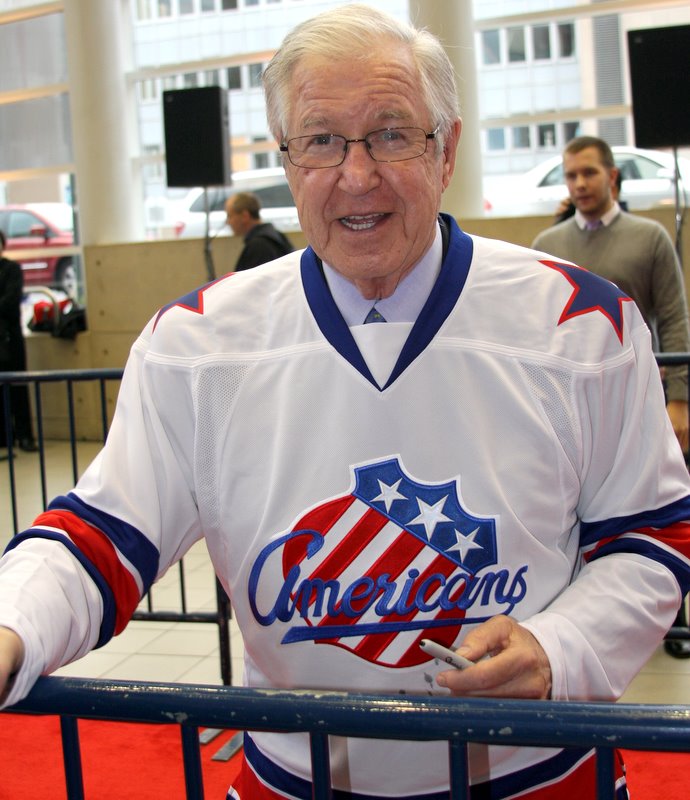By KEVIN OKLOBZIJA
When you’ve spent more than 60 years in a professional hockey as a player, coach, general manager, liaison, goodwill ambassador and front office employee, everyone you’ve come in contact with has a story.
Joe Crozier was a legend with the Rochester Americans, guiding the team to the first three Calder Cup championships in franchise history before moving on to the NHL, then the WHA, then the NHL again before closing his coaching career in Rochester with a run to the finals in 1983-84.
His Amerks won the Cup in 1965, 1966 and 1968, and at one point they were considered by some to be the fifth best team in all of hockey, better than the New York Rangers and Boston Bruins. He guided the Buffalo Sabres to their first playoff berth in 1972-73. He then won a Calder Cup ring in 1986-87 as the mentor to Amerks coach John Van Boxmeer and liaison between the Sabres and Amerks.
Along the way he played with Montreal Canadiens legend Jean Beliveau; coached Al Arbour, Don Cherry and Gilbert Perreault; and coached with Scotty Bowman and Punch Imlach.
“He loved the Amerks and he always talked about the Amerks,” said Jody Gage, the franchise’s all-time leading scorer and a member of that 1987 title team.
“The Crow” died on Tuesday at age 93 in Buffalo, his home for the past four decades. A native of Winnipeg, Manitoba, he had battled dementia for several years.
Here are some memories from those who played for him or worked with him:
‘He ripped every single one of us’
It was May of 1987 and the Amerks were facing elimination in the Calder Cup finals.
The Sherbrooke Canadiens thumped the Amerks 6-1 in Game 5 in what was very much a Marines against the Cub Scouts showing. Two nights later, the players and coaches gathered for a team meal on the eve of Game 6.
Crozier addressed the team.
“He went around the room and he ripped every single one of us,” said Gates Orlando, a star forward on the team. “One by one, he ripped us, and he didn’t leave anyone out.
“Boxie (coach John Van Boxmeer) just sat there with a smile on his face. And then Crow says, ‘John, I wouldn’t laugh because if I had this team, we would have won already.”
And just like that, the players loved Crow again.
Then they went out and defeated Sherbrooke in Games 6 and 7.

A never-ending array of motivational tricks
The Crow was a master of mind games. He believed any little edge could be the difference in winning and losing.
With the Amerks trailing 3-2 in the Calder Cup finals in 1987, he “leaked” information that the Sherbrooke Canadiens had already planned their parade route.
Not true, as it turned out, but it gave his players a little more to stew on.
With the Amerks facing elimination in the 1984 Calder Cup finals against the Maine Mariners, he hired someone to pose as a delivery person, knocking on the dressing room door before Game 5 with a pull-cart loaded with champagne.
“Oh, I guess I have the wrong room,” the man said when the door opened.
That one didn’t work; the Amerks lost the game 5-2 and the series 4 games to 1.
Trust me, son
Rob Ray had come to training camp in 1988 as a fifth-round draft pick, but the Buffalo Sabres hadn’t offered him a contract. And now, the Amerks season was about to begin, and Ray was in uniform and ready to head onto the ice. He wasn’t worried about a contract at the time.
Then Crozier came into the dressing room perhaps 10 minutes before warmups and walked over to Ray’s stall. Ray said the conversation went like this:
Crozier: “Here, you gotta sign this.”
Ray: “I have no idea what it even is.”
Crozier: “Do you want to play?”
Ray: “Well, yeah.”
Crozier: “It’s a contract and you can’t play without it.”
Not exactly a contract negotiation. “I had no idea how much or anything, I just signed it,” Ray remembered.
The voice of experience
Van Boxmeer didn’t have any assistant coaches for his first three seasons as head coach. “You really had nobody to talk about hockey with,” he said.
So while Crozier in his role as liaison provided the Sabres with progress updates on the farm team, he also acted as a sounding board for Van Boxmeer, as well as providing some sound advice.
“He was never pushing things on you but he’d say something to get you thinking,” Van Boxmeer said.
Like when he wondered why Boxie was so calm on the bench.
“I’d stand there with my arms folded and one night Joe says, ‘Son, anybody can stand there with their arms folded on the bench. That’s not what people pay to see.”
Old-school ideals
Crozier and Van Boxmeer believed off-ice distractions were detrimental to team success in the playoffs. Too many honey-dos, Boxie would say.
So in 1987, they booked a block of rooms at what then was the Sheraton Hotel in Batavia before home games. This was a total sequester, too. When the players checked in, they found the phones had been removed from the rooms (and there were no cellphones in 1987).
The game program insert always had a quick-hit player bio, with tidbits such as favorite pregame meal, a season highlight and a maybe a memorable quote.
The quote from the late Richie Dunn in his playoff bio: “Where are the phones?”
Crozier also believed teams should be punished for poor performances, which is why intense skates often followed bad losses. He’d put a folding chair at center ice, sip on a cup of coffee and blow his whistle to signal the start and end of sprints.
“Sometimes you’d wonder, ‘Has he forgotten about us?’ ” said Rick Dudley, who has been a player, coach scout and front-office executive in pro hockey for five decades. Dudley played for Crozier with the AHL’s Cincinnati Swords and then the Sabres.
Enjoy the view
While coaching the Sabres, The Crow wasn’t happy with how most of the team was playing. Well, everyone other than Gilbert Perreault.
Van Boxmeer told the story of one particular game night in Buffalo. As players prepared to head out for warmups, Crozier allowed Perreault go out onto the ice at The Aud but told the rest of the team to stay in the dressing room.
“He told them, ‘All you guys are doing anyway is watching Gilbert skate around so you might as well watch him skate around in warmups on the TVs in the room,’ ” Van Boxmeer said.
True home-ice advantage
In the pre-renovation War Memorial, the visitor’s dressing room was on the basement level, two long flights of stairs below ice level. It was old, there were absolutely no frills, and sometimes there was hot water. And sometimes there was only hot water.
“To be fair, we didn’t always have hot water in our dressing room, either,” Gage said.
At least the thermostat worked in the home room, though. The visitors were at the mercy of The Crow. He’d crank up the heat, making it nearly unbearable to be in the basement.
And there was only one elevator, which players preferred over traversing 30-some stairs in skates. Sometimes the elevator worked, sometimes it didn’t.
“He made me turn it off a lot of nights,” recalled J.C. Ihrig, the former equipment manager who is in his fifth season as equipment manager for the Colorado Avalanche. “It was up to Joe whether the elevator worked.”
Oh, and if the swift-skating Nova Scotia Voyageurs came to town, suddenly the War Memorial ice wasn’t always conducive to a speed game. Legend has it that he’d entice the building crew to alter the temperature gauge, helping to negate the opponent’s speed.

The Crow knew talent
Dudley said Crozier was very much a part of his rise as a player and career in hockey.
“He had an opinion of what you were, and I had proven myself to be a tough guy and that’s what he expected of me,” Dudley said. “Joe basically told me what I had to do to function in the American Hockey League and I did it. He was right, too. I wouldn’t have played if I hadn’t used what I had at the start of my career.”
Crozier also didn’t mind having that toughness element on his team.
“He’d walk down the bench and say, ‘That number so-and-so, we’ve got to slow him down,’ and then he’d nudge me or someone else in that same role and we knew what to do,” Dudley said.
He could rub foes the wrong way
In 1974, while coaching the Vancouver Blazers of the World Hockey Association, Crozier broke the gentleman’s agreement in the league and claimed goalie Don McLeod off waivers from the Bill Dineen-coached Houston Aeros. Back then teams rarely claimed players in the final-cuts waiver period.
It took 15 years but Dineen got his revenge. The Amerks tried to sign J.F. Sauve for the 1989 playoff push. To do so, Sauve needed to be exposed to AHL waivers after signing.
Dineen and the Adirondack Red Wings waited until maybe 10 minutes remained in the 72-hour waiver period to submit the claim.
While the Wings wanted Sauve for their Calder Cup run (a successful run at that), the delayed claim was very much a figurative salvo fired by Dineen.
In Crozier’s defense, his team did need a goalie, and McLeod became his mainstay for three WHA seasons, playing 71, 63 and 66 games.

Former players were good coaches
Al Arbour played four seasons under Crozier with the Amerks. He later coached the New York Islanders to four consecutive Stanley Cup championships in the 1970s.
Don Cherry played under Crozier for five seasons in Rochester and another in Vancouver of the Western Hockey League. Cherry was the NHL coach of the year in 1975-76 and guided the Boston Bruins to the Stanley Cup Final in 1976-77 and ’77-78.
“I’m sure Al Arbour took a lot of his coaching and theories from Joe, and I’m sure Don Cherry did, too,” Gage said. “Remember, Joe was coaching the fourth- or fifth-best team in the world back then.”
Bruce Boudreau played for Crozier with New Brunswick of the AHL in 1979-80, then parts of the next two seasons with the Toronto Maple Leafs. He guided the Hershey Bears to the Calder Cup in 2005-06 and now begins his 14th season as an NHL head coach.
In his testimonial on Crozier at the 2012 AHL Hall of Fame induction ceremony, Boudreau said he still uses drills he learned from Crozier.

He kept everyone guessing
Crozier thrived during a time when coaches ruled and players listened.
“Joe would do things and sometimes you’d think, ‘A normal person wouldn’t do that,’ ” Dudley said. “When you played for Joe, you worked, and you were scared to death. You didn’t know from one day to the next what would happen. He wanted you on edge.”
But in the end, he wanted to win, and he wanted his players to be part of it.
“He really was very caring, and it showed,” Gage said.



